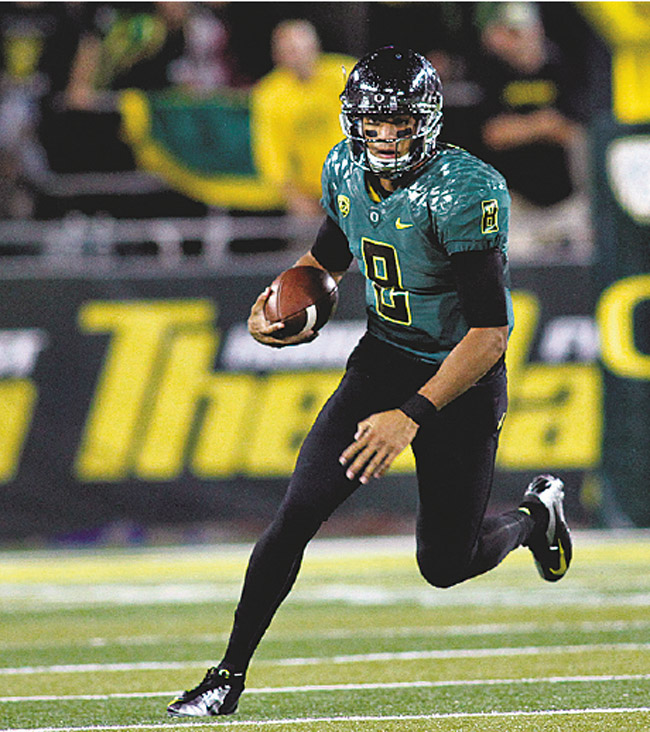NCAA Fair In Oregon Ruling

The NCAA ruling was good news for the Heisman hopes of Saint Louis grad Marcus Mariota | University of Oregon Athletics photo
When the NCAA announced its sanctions against the University of Oregon following a 27-month investigation, there had to be big smiles in Eugene and wherever Duck fans reside. The penalties, after stripping away the veneer of a “three-year probation,” are negligible, falling somewhere between a slap on the wrist and a pat on the butt. There is no bowl ban and nothing to stop Oregon from competing for a PAC-12 title or a national championship.
The Ducks will have the number of paid recruiting trips they can offer cut from 56 to 37, but over the last four years they’ve averaged 41. They will have their evaluation days trimmed back by just over 10 percent and will lose one scholarship for each of the next two years.
These all amount to minor inconveniences. The only penalty with teeth is the 18-month show cause penalty assessed to former coach Chip Kelly. It would ban him from coaching in college for that period of time, but considering Kelly is in the first year of a five-year, $32.5 million contract with the Philadelphia Eagles, that one is rendered meaningless as well.
Considering that the crime that triggered the investigation and subsequent sanctions was a $25,000 check written to Willie Lyles, who was once a legitimate recruiting service provider but had crossed over to the dark side of steering players for cash, the penalty is proportionate. Relative to other incidents at a number of schools, this is small potatoes.
But that has not stopped the NCAA from overreacting in the past. Has the NCAA suddenly become a kinder, gentler organization anxious to change its ways?
There is an explanation far less benign, considering the NCAA’s desperation in light of the botched investigation at the University of Miami and the pending possibility of major liabilities in the Ed O’Bannon case. It is well known that NCAA president Mark Emmert is an acutely political animal. He currently is struggling with Miami president Donna Shalala, who is willing to go toe to toe with Emmert and his organization. And while Shalala has some political connections, she is not even in the same universe as Oregon’s biggest benefactor, Nike founder/CEO Phil Knight. A number of surveys list him as the single most influential person in American sport. His estimated net worth is just over $14 billion. Is it possible that Emmert and the NCAA decided to not risk alienating Knight by slapping Oregon around like they have most everybody else? If “Uncle Phil” had taken umbrage over severe sanctions and decided that Emmert and the NCAA were deserving of his full attention, Emmert’s seat would have gotten even warmer than it already is. And Emmert has $1.6 million annual reasons not to make Knight angry.
We can all hope that those considerations didn’t affect the sanctions levied against Oregon, but as somebody once pointed out in another context, hope is not a strategy. bobbyc@hawaii.rr.com





